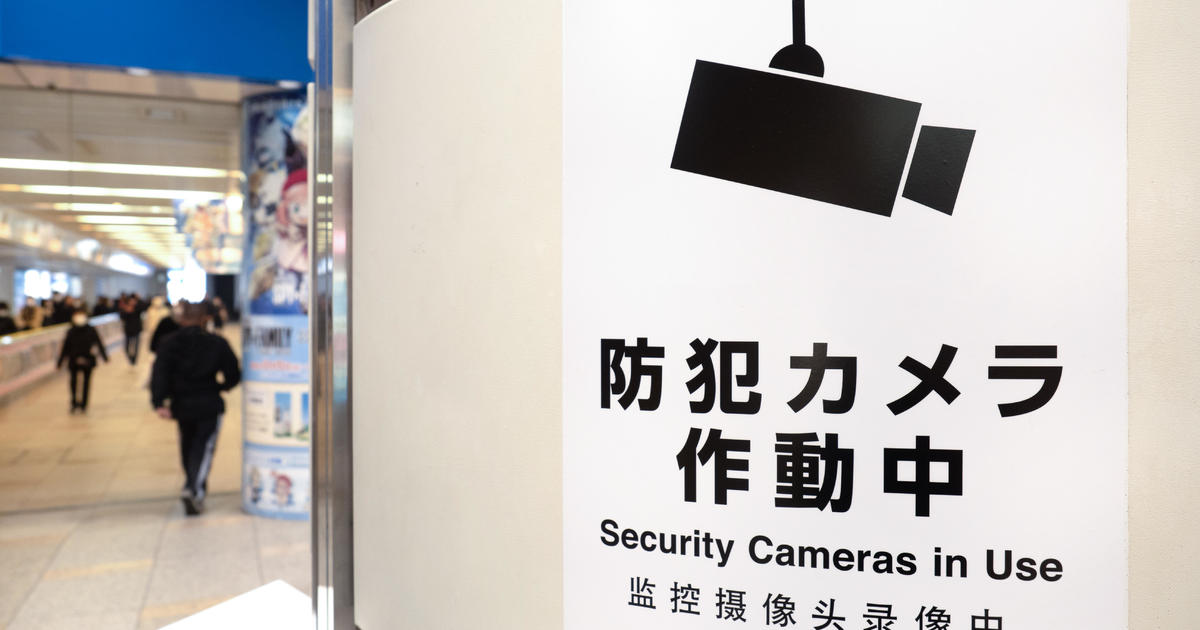CBS News
A man fired by a bank for taking a free detergent sample from a nearby store wins his battle in court

Tokyo — The Tokyo District Court typically garners headlines for high-profile cases, parsing issues such as whether married couples should be allowed to use separate surnames, privacy battles over the “right to be forgotten,” and gender discrimination in academia. But a bizarre lawsuit this month led the court into more prosaic territory.
It could be dubbed the case of the Freebie-Lover vs. the Angry Store Owner.
As chronicled in Japan’s Asahi Shimbun newspaper, the saga began just before opening hours at a shopping mall in Nagano Prefecture. On his way to work, an unidentified bank branch assistant manager happened to spot a nearby store offering modest giveaways — free packets of laundry detergent displayed in front of the store to lure customers.
Noting the “Help yourself” sign, he did so, and then went on his way.
But it did not sit well with the store’s staff. After checking to make sure the security cameras had captured the suds-lifter red-handed, an employee quickly informed the bank that, as the soap-grab had taken place before business hours, it amounted to theft.
The bank executive, the man’s boss, and even the bank’s area manager offered multiple, profuse apologies. All bank employees were ordered to alter their commute routes to avoid walking in front of the cellphone store — no small feat, as the store is located on the corner just opposite the bank branch.
But the store’s management was not to be placated, despite the fact that the promotional giveaways had been provided free by the manufacturer and were likely worth less than $2 each. The store demanded that the bank employee be transferred to another branch.
Worried about possible fallout, the bank ended up firing the man, who then sued his former employer on grounds of unfair dismissal.
Since the detergent was outside for the taking, he argued, grabbing a packet could not possibly constitute larceny — and besides, as a potential customer, he was entitled to one.
For its part, the bank argued that given the gravity of his job handling customers’ assets, the man’s decision to pocket the soap — while perhaps not filthy lucre — fell outside the bounds of acceptable behavior. It was also noted that the man in question had a history of scooping up freebies from the shop.
In its March 8 verdict, the Tokyo District Court ruled that while such an act could be construed as theft, and in specific instances could justify dismissal, such a harsh penalty was unwarranted in this case. The fact that the man was technically still off-duty when the malfeasance occurred, the court said, obviated the need for any harsh penalty by the bank.
Noting the trivial value of the pilfered item, and the man’s repeated displays of remorse, it ordered the bank to give the man backpay, and his job back.
“The time and money invested in this case by all parties,” an Asahi columnist wrote in a postscript, “could have bought thousands of packets of detergent.”
CBS News
Tyler Perry and Kerry Washington on bringing the untold story of “Six Triple Eight” to the big screen

Hollywood powerhouses Tyler Perry and Kerry Washington have joined forces to tell the remarkable story of the 6888th Postal Battalion, which was the only women’s Army Corps unit of color to be stationed in Europe during World War II. Perry — who wrote, directed and produced the film — describes “Six Triple Eight” as an important chapter in U.S. history.
The film centers on the women of the 6888th who were sent to Europe with the daunting task of delivering a backlog of nearly 17 million pieces of mail to U.S. soldiers and their families. The women not only completed the mission, but did so in just 90 days, defying expectations. Kerry Washington stars as Major Charity Adams, the real-life commanding officer of the unit and the highest-ranking Black female officer during the war.
At Joint Base Myer-Henderson Hall near Washington, D.C., Perry and Washington discussed the significance of sharing this story.
Washington’s portrayal of Adams was a key part of the project. Perry explained his choice of Washington for the role, saying, “I thought, ‘Let’s show the world that there’s something so different here from you. I know they know Olivia Pope. But when we’re done, they’re going to see no one but Charity Adams.'”
The film also brought intense moments of historical reflection. Perry recounted a personal encounter with Lena King, one of the last surviving members of the 6888th, who was 99 years old at the time and home on hospice.
“I actually wanted all of the surviving members to see it,” he said. “Lena was the only one who got a chance to. I rushed a cut together and bought it to her.”
King’s reaction to the film was unforgettable for Perry.
“We watched it and she was in tears. And at the end of it, she’s saluting and she’s crying. And she says, ‘Tyler, thank you for letting the world know that black women contributed into war effort,'” Perry recalled.
Both Perry and Washington recognized the story’s importance, emphasizing that the women of the 6888th had been overlooked historically.
“There were 855 Black women and women of color who served in World War II, and no one knew it,” Perry said. Washington added, “And went overseas to represent this country.”
The film also explores the strength of these women who faced immense odds.
“It really is about exceeding expectations and being able to achieve against all odds and being able to stand up to people who don’t believe in you to say, ‘I believe in me. And I believe in we,'” Washington said.
You can stream “Six Triple Eight” on Netflix.
CBS News
Hours left to prevent government shutdown after Trump slams Johnson bill

Watch CBS News
Be the first to know
Get browser notifications for breaking news, live events, and exclusive reporting.
CBS News
Medicare’s new $2,000 prescription drug cap goes into effect Jan. 1. Here’s how it works.

Starting Jan. 1, millions of Americans who get their prescription drugs through Medicare could get a major financial break when a $2,000 out-of-pocket spending cap on medications goes into effect.
The yearly price cap has been in the works since President Joe Biden signed the Inflation Reduction Act into law in 2022, with that legislation including provisions tackling drug costs for seniors as well as other Americans. While some of those other rules have already kicked in, such as a $35 price cap on insulin for seniors, Medicare’s $2,000 drug cap will become effective starting next month.
The out-of-pocket cost cap could be a “game changer” for many seniors, Ryan Ramsey, the associate director of health coverage and benefits at the National Council on Aging (NCOA) told CBS MoneyWatch. In the first year of the cap, about 3.2 million Medicare recipients are likely to see lower costs due to the new rule, particularly seniors who take multiple medications or have high-cost prescriptions, according to an analysis from AARP.
Before the law, there was no out-of-pocket cap for Medicare’s Part D, the section that covers prescription drugs, which left seniors at risk of “significant financial burdens,” the AARP noted.
“Having a cap where somebody can know, ‘Hey, this is what my maximum out of pocket will be for my medication,’ that will be an enormous deal,” Ramsey noted.
Here’s what to know about the new Medicare prescription drug spending cap.
Who is covered by the new Medicare drug cap?
The new $2,000 out-of-pocket cap on prescription drugs covers everyone with a Medicare Part D plan, which is the section of Medicare that covers most pharmaceutical products. The annual new cap also includes people with drug plans through Medicare Advantage, which are health plans offered by private insurers.
There are more than 50 million older Americans who have either Part D or prescription plans through Medicare Advantage, according to health policy site KFF.
Will Medicare’s so-called “donut hole” still exist?
No, according to Medicare. “Because of the prescription drug law, the coverage gap ends on Dec. 31, 2024,” its website states.
The so-called “donut hole,” or coverage gap, has affected almost all prescription plans. In the current calendar year, seniors could enter the donut hole once they and their plans had spent more than $5,030 on drug costs, at which point they were on the hook for out-of-pocket drug costs until they hit $8,000 in spending. Catastrophic coverage would kick in above that amount and cover additional spending.
Which prescription drugs are covered by the Medicare cap?
The $2,000 cap includes all the prescriptions that are in a Medicare recipient’s Plan D formulary, or a plan’s list of covered drugs. That means that if a doctor prescribes a drug that’s not on your formulary, it won’t be covered by the $2,000 cap, potentially adding to your costs.
Medicare enrollees can ask their doctors to prescribe drugs that are covered on their formulary, Ramsey noted.
“What I advise, in a situation where you are prescribed a new prescription, take your formulary to the doctor’s office. Say it’s a drug pressure medication, and you can say, ‘Can you make sure you can prescribe something that’s on my plan?,'” he noted.
In other cases, such as for new medications or drugs for which there aren’t alternatives, Medicare enrollees can ask for a drug exception, which can be granted if deemed medically necessary, according to Medicare.
Because formularies can change their coverage each year, and people’s prescriptions can also vary over time, it’s important to check your Part D plan during open enrollment each year to ensure you’re in the best drug plan for your needs, Ramsey added. Open enrollment typically occurs between mid-October to early December.
Do I need to sign up for the $2,000 out-of-pocket cap?
No, the cap will automatically be applied to your Part D plan, and the plan will track your spending. Once you hit $2,000, the new cap will go into effect and cover your eligible drug costs beyond that amount.
What costs are covered in the $2,000 Medicare Part D spending cap?
The new measure will cover medications included in your formulary, as well as your deductible, copayments and coinsurance for drugs that qualify for the cap.
However, the cap doesn’t include coverage for drugs outside of your Part D plan, which means that it also doesn’t apply to pharmaceuticals covered by Medicare Part B, which include drugs you typically wouldn’t give to yourself, such as injectables that you’d get at a medical office.
It also doesn’t cover your Part D premiums.
The cap will allow people “to make better decisions on how to get their health care,” Ramsey noted. Prior to this change, “I have had discussions with people, ‘Am I going to buy groceries late in the year or pay for my prescriptions?'”









